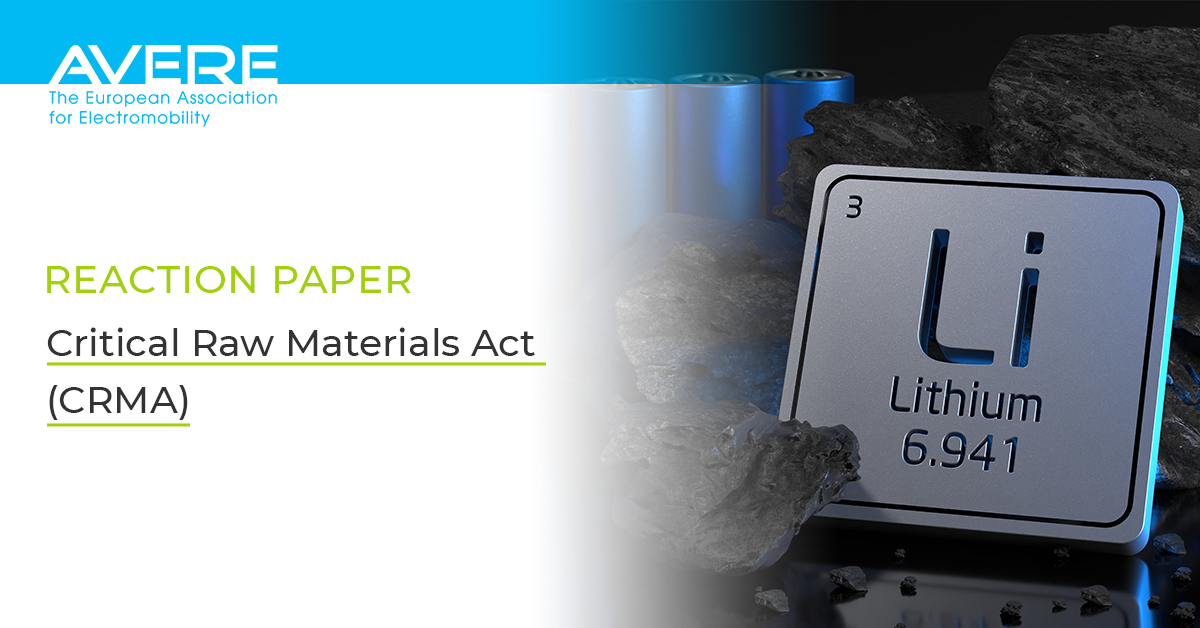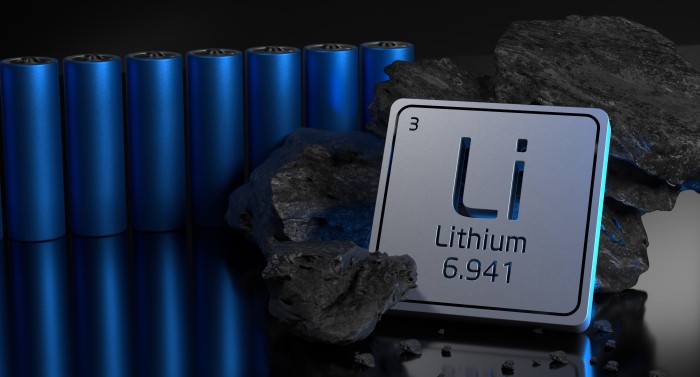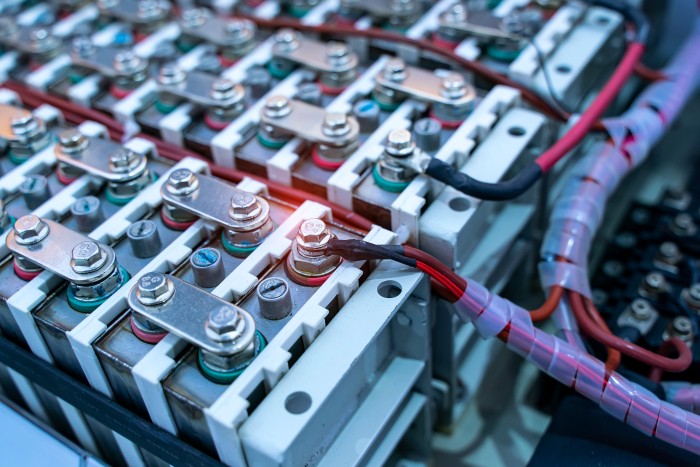
AVERE welcomes the Commission’s proposal for a European Critical Raw Materials Act (CRMA).
Raw materials such as Lithium and Rare Earth Elements will form a crucial enabler of the EU’s energy transition in the coming years. In the context of accelerating global competition for critical and strategic resources, Europe must maintain its openness to trade and mutually beneficial international cooperation, and better exploit its domestic production potential, whilst strengthening its resilience and de-risking its current supply chain structures.
REACTION PAPER
to the Critical Raw Materials Act (CRMA)

The Commission’s proposal addresses many of the key blockers for the extraction, refining and recycling of Critical Raw Materials (CRM) in Europe - notably, AVERE strongly supports the focus on accelerating administrative timelines, establishing one-stop shops. Another welcome element is the encouragement of national circularity measures, as geological availability of many CRM in Europe will be limited, necessitating the optimal use of resources already in circulation.
However, scope for improvement remains. Notably, the need to accelerate procedures to build up a strong European raw material industry, particularly through the establishment of a specific automatic recognition procedure for certain Critical Raw Materials Projects to be recognised as strategic.Additionally, Europe needs to ensure a fast tracking procedure is set up for the shipment of waste lithium-ion batteries for intra-EU recycling. AVERE also believes Europe’s Raw Materials supply must be built sustainably from the start. As such, AVERE supports stronger provisions on sustainability, setting minimum standards across the EU, while more strongly involving industry and civil society in the governance of the new legislative framework. On permanent magnets, AVERE opposes minimum recycled content requirement as these could lead to perverse incentives (e.g. premature recycling) if insufficient material is available within the Union.
More importantly, AVERE believes that new dedicated funds, ideally at European level, but also at national level, should be set up to support the creation of a dynamic European treatment, refining and recycling industry.
AVERE stands ready to engage in detail with European decision makers on how to guarantee a steady supply with Raw Materials for the continent in order to support its decarbonisation ambition over the coming years.
Our main recommendations:
1. Include an automatic recognition of certain Critical Raw Materials Projects as strategic
AVERE believes that certain critical raw materials projects are essential to the European Union's strategic autonomy and to the development of the critical raw materials industry value chain, which is currently in its infancy on the European continent. As such, we call on lawmakers to allow for the automatic recognition of certain Critical Raw Materials Projects as strategic under certain conditions. We suggest including the following conditions:
- if the CRM project is focused on conversion and refining of materials into battery-grade materials;
- or if it helps limit significant EU dependency on a single third country;
- or if it takes place in a recognised “Just Transition Fund” territory
This approach would speed up the process for stakeholders wishing to invest in Europe, while supporting the relocation of key industries and promoting job creation in the net-zero technology value chain.
2. Build synergies with the Waste Shipment Regulation by ensuring a fast-track procedure in the shipment of waste lithium-ion batteries for intra-EU recycling
Given the scarcity of resources and the current ambition to raise recycling targets of lithium-ion batteries, it is essential for the European Union to establish a framework with a fast-tracked procedure for the shipment of waste lithium-ion batteries for intra-EU recycling.
Explicit steps should also be taken to facilitate the recycling of batteries and their intermediate waste streams in Europe: the Commission’s accompanying communication already includes an announcement to “Propose in 2024 the inclusion of waste codes for Lithium-ion batteries and intermediate waste streams (“black masses”) under the European List of Waste to ensure their proper recycling within the EU.” Additionally, blockers for shipping spent Li-ion batteries across EU borders, which are currently significant, should be removed by giving them an EU-wide waste status and creating a dedicated fast-track procedure for recycling them.
AVERE therefore calls for an inclusion of a paragraph within the Waste Shipment Regulation specifying waste codes for Lithium-ion batteries and intermediate waste streams (“black masses”) and setting up a fast-track procedure for their shipment for recycling within the Union. Alternatively, AVERE would welcome a delegated act achieving similar objectives.
Our secondary recommendations:
3. Maintain administrative simplifications without undermining environmental protection and civil society involvement
AVERE welcomes the administrative simplifications and the acceleration of permitting procedures contained within the Commission proposal. Steps such as binding limits to administrative timelines, the establishment of national one stop shops, and the bundling of environmental impact assessments address some of the key administrative hurdles facing CRM extraction, refining and recycling projects in Europe today.
However, as crucial as Europe’s Access to Critical Raw Materials is in its transition to carbon neutrality, this interest should not per se override other environmental objectives such as biodiversity and the EU’s zero pollution ambition. Especially projects in protected areas should be subject to a clear assessment and weighing of costs and benefits, and the strictest environmental conditions in their implementation.
AVERE also encourages to strengthen the engagement of local communities, especially indigenous communities. While the time limits to public consultations are welcome, they should not preclude proper involvement of residents, as public buy-in is key for the success of mining and refining projects in Europe.
4. Provide dedicated funding
While the draft act provides for a lot of administrative streamlining and encourages the mobilisation of private investment, increased public support may be needed to make a viable business case for many CRM projects in Europe, which are often more costly than similar projects in other jurisdictions. This may take the form of both CapEx and OpEx support, e.g. through tax credits and/or direct subsidies.
The EU should continue to revise and streamline its state aid rules to this end, and consider establishing a dedicated fund to support the capital investment needed for, for example, rare earth separation plants. Funding could be either provided by Member States or come from new EU own resources such as a CRM tax (see point 4 on materials efficiency). Projects outside the EU should be eligible to receive funding as well, as long as they have a clear and unequivocal link to the EU’s Raw Materials supply.
5. Insert stronger sustainability provisions
Enshrining high Economic, Social and corporate Governance (ESG) standards into any critical minerals policy is fundamental to the success of any such policy. The CRMA proposal contains very welcome first steps to improve the sustainability of Critical Raw Materials, notably the possibility of introducing environmental footprint declarations for certain materials with a “significant environmental footprint”, and the certification of multi-stakeholder sustainability schemes.
However, more binding sustainability provisions should be introduced: criteria for the recognition of multi-stakeholders scheme needs to be predictable and ambitious, with clear deadlines to approve the equivalence. Only schemes with multi-stakeholders governance (industry, civil society, authorities), encompassing all stages of the raw materials value chain, should be recognised. Over time, footprint declarations should be extended to cover all critical raw materials. That said, we are asking legislators to exempt raw materials used in battery applications already covered by the EU Batteries Regulation from environmental footprint reporting. Indeed, the EU battery regulation has already set clear and high standards for the environmental sustainability of batteries. The multiplication of provisions under different European legislations will create too many obstacles that risk dissuading essential raw material industries from investing in Europe.

Additionally, it is essential that the ESG and due diligence standards be applied equally to the EU and third countries partners to ensure a level playing field as well as sustainable practices throughout the entire raw materials value chain. This should include stringent environmental, social and labour commitments taken by the respective project promoters.
6. Maintain the Commission’s balanced approach on stockpiling
Stockpiling of Critical Raw Materials is a rightly controversial issue: while stockpiling may help dampen unexpected supply shocks, it may also further exacerbate ongoing supply shortages. As such, AVERE welcomes the absence of binding stockpiling targets in the proposal, and the focus on reporting and coordination of existing strategic stocks supported by purely indicative Commission recommendations. AVERE explicitly warns against any reinforcement of this proposed framework at this stage in view of the aforementioned potential adverse effects.
7. Remove recycled content requirements for permanent magnets
The proposed recycled content requirements for permanent magnets may create perverse incentives if insufficient material is available in the EU, e.g. the premature recycling of still functional products. As such, they should be removed and/or introduced in a more gradual manner based on actual availability and careful impact assessments in the future.
8. Open up the Critical Raw Materials board to industry and civil society
AVERE welcomes the establishment of the Critical Raw Materials Board as a dedicated body monitoring the EU’s progress towards a stable, resilient and sustainable supply of key materials for its transition. While acknowledging the need for certain sensitive discussions in this context to be led behind closed doors and with a limited circle of participants (i.e., member states and Commission), the European Parliament as well as stakeholders from industry and civil society should not per se be limited to participating as mere observers upon invitation.
In the spirit of broad and democratic participation, external stakeholders should instead be permitted to apply to join the board on a permanent basis, excluding participation only in politically especially sensitive debates.
